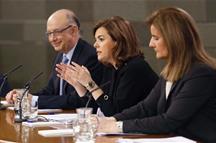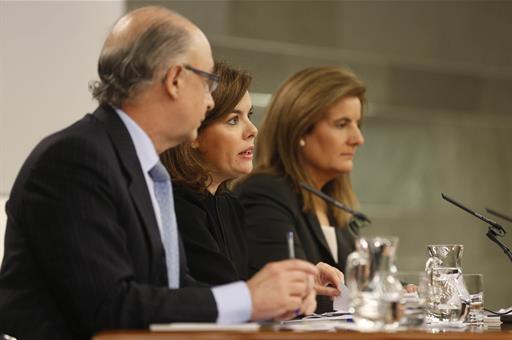Council of Ministers
Government approves reform of Vocational Training
Council of Ministers - 2015.3.20
Moncloa Palace, Madrid
The Council of Ministers approved a Royal Decree Law on the urgent reform of the Vocational Training system at an employment level.
The Vice-President of the Government, Soraya Sáenz de Santamaría, announced that this is one of the most important structural reforms of this legislature because it fosters access to higher quality jobs and will contribute to the fight against inequality. Furthermore, she highlighted that it will strengthen transparency and the control of fraud, which in some cases has been linked to training and employment funds.
In the same regard, the Minister for Employment and Social Security, Fátima Báñez, stressed that "fraud will be subject to zero tolerance" and that each euro allocated to training must be used for this purpose.
The minister pointed out that the present Vocational Training model is a system "consolidated over time" that is currently used by some 475,000 companies. However, she considers that the system suffers from a lack of strategic planning, quality and transparency. Moreover, there is an imbalance between the offer of training content and job offers and hence "this model can be improved on", she argued.
New training model
 EFEFátima Báñez recalled that the reform has arisen from a lengthy process of dialogue and participation and responds to the Agreement on proposals for tripartite negotiations signed by the President of the Government and the social stakeholders (the trade unions CCOO, UGT and the employers' associations CEOE and Cepyme) on 29 July 2014.
EFEFátima Báñez recalled that the reform has arisen from a lengthy process of dialogue and participation and responds to the Agreement on proposals for tripartite negotiations signed by the President of the Government and the social stakeholders (the trade unions CCOO, UGT and the employers' associations CEOE and Cepyme) on 29 July 2014.
The minister announced that the aims are clear: to foster stable and quality job creation, improve business competitiveness, offer guarantees to improve employability and the professional promotion of workers, and consolidate a culture of training within the productive system.
Moreover, the reform seeks to achieve greater effectiveness, efficiency and transparency in the management of resources and for the system to be subject to evaluation. "We want evaluation to also be one of the key elements and for coordination between regional governments and central government to improve", said Fátima Báñez.
The new model, she explained, will apply to all public authorities and social stakeholders will continue to play a key role, above all in the planning and scheduling of training, since "they are more familiar with the productive fabric than anyone". "We want them to detect the needs of this fabric in advance. A country with such a high level of unemployment as Spain cannot have job vacancies, and these vacancies do arise", she added.
Another new feature is that multiannual strategic planning will be implemented so that training can be structured in line with present and future needs. A training record will also be set up associated with each worker that will certify all training received during their career. Tele-training and on-going in-house training will be boosted, particularly in small- and medium-sized enterprises.
Fátima Báñez highlighted that "this is a radical change" in the job offer and subsidy training model. This will be managed on a 100% competitive basis of award system such that "all centres will be given access to rounds of training under the same conditions and it will be the market that chooses those of the highest quality".
As regards the unemployed, a new feature is the implementation of the 'training cheque' whereby the unemployed person can choose the centre where they wish to receive training and the corresponding public authority will directly pay the training fee to this centre. The minister argued that when this training is subsidised only 25% of the funds will be advanced to the centre. "To date, it was possible to make a 100% advance payment and this has given rise to irregularities in many autonomous regions that we wish to avoid in the future".
The evaluation process will be on-going to see the impact of training. And to avoid fraud, a special unit will be set up, under the Employment and Social Security Inspectorate, and penalties will be increased for those companies that use the funds received irregularly. They will be disqualified from working with public authorities on training matters for a term of five years.
Public Employment Offer
 EFEThe Council of Ministers approved the 2015 Public Employment Offer, described by the Vice-President of the Government as "a very noteworthy effort to improve certain public services that fall under the General State Administration". Soraya Sáenz de Santamaría highlighted the fight against fraud in public services, improving the functioning of the administration of justice and improving local authorities as among its aims, together with strengthening the police and the Guardia Civil.
EFEThe Council of Ministers approved the 2015 Public Employment Offer, described by the Vice-President of the Government as "a very noteworthy effort to improve certain public services that fall under the General State Administration". Soraya Sáenz de Santamaría highlighted the fight against fraud in public services, improving the functioning of the administration of justice and improving local authorities as among its aims, together with strengthening the police and the Guardia Civil.
The Minister for the Treasury and the Public Administration Services, Cristóbal Montoro, argued that as a result of the economic crisis, the government applied "a very strict policy to freeze the size of the public workforce" from the start of this legislature. He pointed out that the public administration services as a whole now have a similar sized workforce to that of 2003-3004.
The situation has changed as from the Budget Act for 2015; the replacement rate has risen from 10% to 50% and can exceed this percentage in those areas where the government considers it is most necessary to step up the size of the workforce. As happened in 2014, together with the ordinary employment offer, the government has approved another extraordinary offer aimed at priority areas. "It is far from a question of the public sector workforce continuing to be reduced as it has to date, in fact it is quite the opposite: the State needs to provide the appropriate human resources to provide quality public services", argued the minister.
New positions and internal promotion
The total number of job positions on offer amount to 11,250. Of these, 7,416 are new positions (an increase of 340% on last year) while the rest, 3,834, are allocated to internal promotions.
The ordinary offer of new job positions includes 3,098 under the General State Administration and 50 for local authority public servants enabled at a national level - "the guarantors of the operation of our local authorities" - according to Cristóbal Montoro. Another 1,350 positions are designed to strengthen personnel and reduce temporary postings in the administration of justice. This section is complemented by another 1,374 positions for the National Police Force and 820 for the Guardia Civil (compared with 314 and 159, respectively, last year).
In terms of the extraordinary offer, the majority of the positions are allocated to stepping up the fight against fraud, fundamentally in relation to the Spanish Tax Agency.
The minister specified that the sum total of the two blocks of offers will result in an increased number of personnel to combat fraud of 784 people: including 50 tax inspectors, 323 technical staff, 50 tax agents and 264 agents to combat employment and Social Security fraud.
Cristóbal Montoro also underlined the increase in the number of positions designed for internal promotions on 2014 (79% more), since it is very important for public servants to see that "they truly have a future in their jobs". In percentage terms, the greatest increases under this section correspond to the Administration of Justice, the General State Administration and the National Police Force.
Voluntary Work and the Third Sector
 EFEThe Council of Ministers submitted to Parliament the Draft Laws on Voluntary Work and the Third Sector, two laws that fall under the government's Social Agenda, "one of the key elements we are pushing through in this last year of this legislature", according to Soraya Sáenz de Santamaría.
EFEThe Council of Ministers submitted to Parliament the Draft Laws on Voluntary Work and the Third Sector, two laws that fall under the government's Social Agenda, "one of the key elements we are pushing through in this last year of this legislature", according to Soraya Sáenz de Santamaría.
The Draft Law on Voluntary Work, pointed out the Vice-President of the Government, seeks to resolve regulatory disparities that have arisen over the last 20 years in which the current regulation has been in force, establish a legal framework for their action and boost voluntary work as a lifelong career. Around 15% of adult Spaniards carry out work of this nature, the sixth highest percentage in the European Union, pointed out the Vice-President of the Government.
Soraya Sáenz de Santamaría referred to the improvements introduced in the new text of the law compared with the Draft Law approved on 23 January. The minimum age for the participation of minors - always with parental consent - is set at 12 years of age. The circumstances in which access to voluntary work is limited are extended: in addition to offences against minors, gender-based violence and domestic violence, sentences for illegal people trafficking and terrorism are included. And the section relating to the promotion of voluntary work from companies is clarified: participation must be "free and voluntary", although this is carried out in entities tied to business structures.
On another note, the Draft Law on Social Action in the Third Sector establishes a "modern" regulatory framework "adapted to the current reality of this sector to strengthen supportive actions from social entities" and its role in the design and execution of public policies, stressed the Vice-President of the Government.
This area is comprised in Spain of more than 29,000 organisations of a private, not-for-profit and voluntary nature that provide services to more than 5 million citizens; with more than 500,000 people working on a remunerated basis and another 900,000 volunteers.
Current affairs
 EFEThe Vice-President of the Government started the press briefing by conveying, on behalf of the government, her sincere condolences to all the families of the victims of the attack in Tunisia on Wednesday and to all victims of terrorism. She asserted that this is a time to convey our support to them and for the international community to work together to "strengthen our democratic instruments, to combat terrorism and to defend fundamental liberties and the Rule of Law".
EFEThe Vice-President of the Government started the press briefing by conveying, on behalf of the government, her sincere condolences to all the families of the victims of the attack in Tunisia on Wednesday and to all victims of terrorism. She asserted that this is a time to convey our support to them and for the international community to work together to "strengthen our democratic instruments, to combat terrorism and to defend fundamental liberties and the Rule of Law".
When asked about his participation in a private consultancy firm set up in 2006, the Minister for the Treasury and the Public Administration Services, Cristóbal Montoro, recalled that, as he had already explained in Parliament, as from 2008, when he returned to the Lower House of Parliament, he left that company because he needed to devote himself full-time to his work as an MP. "I could not combine holding a parliamentary seat with any other form of work at all", he stressed.
In relation to the parallel nature of donations to the NGO Cáritas española and the People's Party, the Minister for the Treasury pointed out that the two institutions enjoy "equivalent" tax treatment because they are general interest not-for-profit institutions that have a "social object, that give sense to our rule of law and to our system of liberties".
Cristóbal Montoro pointed out that the information provided by the Tax Agency to Judge Pablo Ruz was sent by the public officials from that office, and that those public officials "are not given political instructions" under any circumstances, and that their professionals enjoy "an unimpeachable reputation" and "must be respected by everyone".





